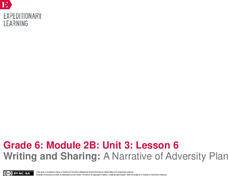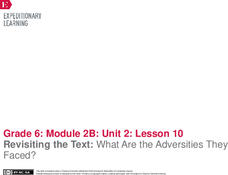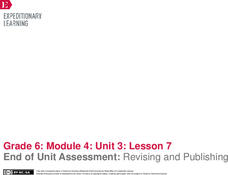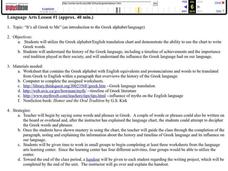EngageNY
Mid-Unit Assessment and Establishing a Context for My Hero’s Journey Narrative
How do writers engage their readers in a story? Pupils consider the question and use the informational text, "The Hero's Journey" to justify their plan for their own fictional narrative. To that end, scholars write an explanatory...
EngageNY
Mid-Unit 3 Assessments, Part 1: Summarizing, Analyzing and Discussing Research
Speak up and listen up. Scholars participate in a speaking and listening mid-unit oral assessment. They discuss whether their rules to live by should be a personal choice or made into a law, and then they complete an exit ticket to...
EngageNY
Mid-Unit Assessment: Small Group Discussion: How Do Modern Poems Portray Modern Adversities?
How is a poem similar to and different from a news article? Pupils use a graphic organizer to compare and contrast the two genres. Also, as part of a mid-unit assessment, scholars participate in small-group discussions based on poetry...
EngageNY
Writing and Sharing: A Narrative of Adversity Plan
When life brings you lemons .. write about it! Scholars work with partners to complete graphic organizers analyzing two narratives. Next, they develop an outline for their narrative writing assignment about a personal experience with...
EngageNY
Drafting Introduction and Conclusion
In conclusion ... Scholars analyze the model essay Adversity Faced by Townspeople in
the Middle Ages to gain a better understanding of introductory and concluding paragraphs. After studying the author's strategies, learners begin...
EngageNY
Revisiting the Text: What Are the Adversities They Faced?
Where's the evidence? Scholars take a look at the evidence section of a Literary Argument Essay Rubric. They discuss terms used in the rubric and then begin thinking about collecting evidence for their own essays. They also revisit their...
EngageNY
Performance Task Preparation: Peer Critique and Mini-Lesson Addressing Common Errors: Revising Draft Essay to Inform
Time to revise! Using a writing evaluation rubric, scholars participate in a peer editing process to provide feedback on each others' informative essays. Next, pupils begin revising their drafts based on the feedback they receive.
EngageNY
Introducing “Comprehending the Calamity”
Some things are beyond comprehension. Scholars read an excerpt from "Comprehending the Calamity," a primary source text about the 1906 San Francisco earthquake. After identifying the gist, pupils complete anchor charts to analyze how the...
EngageNY
Researching Facts
How did the 1906 San Francisco earthquake and fire affect the city's inhabitants? Scholars embark on a quest to discover the answer as they work in small groups to research articles about the event. They finish by completing a jigsaw...
EngageNY
End of Unit 2 Assessment: Final Literary Analysis
Get ready to review and revise! Scholars peer edit each other's literary analysis essay drafts. Next, using peer and teacher feedback, pupils compose their final drafts.
EngageNY
Researching: Eyewitness Accounts, Part 2
Continue on. Learners continue with the work they began in the last lesson looking for quotes to complete an eye witness interview. Pupils work in their groups to examine the texts in their research folders and The Great Earthquake and...
EngageNY
End of Unit Assessment: Revising and Publishing
Dictionaries, thesauruses, word walls, oh my! Pupils use several resources to revise their position papers to include appropriate vocabulary. Then, after peer editing, scholars write the final drafts of their essays and self-assess using...
EngageNY
Mid-Unit Assessment: Completing My Draft Position Paper
What's the difference? Scholars analyze the similarities and differences between introductory and concluding paragraphs. Then, using a model essay as a guide, they write their draft position papers.
EngageNY
Planning Content of Informative Consumer Guide: The Issue of Overfishing and Fish Depletion
Let's get organized! Pupils organize the information they have gathered about overfishing into a Quote Sandwich graphic organizer in preparation for their informative consumer guides. Next, they engage in a pair share activity to discuss...
EngageNY
Mid-Unit 3 Assessment, Part 2: Explaining How New Information Connects to the Topic
Let's talk it out. Using the resource, scholars work in triads to discuss how their research has deepened their understanding about sustainable fishing. Next, pupils engage in a whole-class discussion to consider their next steps toward...
Memorial Hall Museum
Dedham Deed
Class members examine primary source documents that expose the contrasting views of land ownership between the Pocumtuck and English settlers.
British Council
Christmas
Pupils learn more vocabulary and English language by taking a close look at the words Happy Christmas and working in groups to see how many words they can make of the letters. Scholars then take a quiz to test their knowledge about...
Curated OER
Australian English Slang Terms-- Part 1
In this language arts and geography worksheet, learners read 15 slang phrases from Australia and match them to their meanings. Example: a barbie (a barbecue)
Curated OER
Mini Beasts and Dialect
Discover the differences in dialect. Inquisitive minds read poems and discuss how words or phrases are different in standard English and other dialects. Using a dictionary, class members locate the definition of each word, find...
Curated OER
Conversation Lesson: The Necessity of Grammar
Start a conversation to convey proper English grammar. In groups pupils voice their opinion, have well supported disagreements, and explain why they feel as they do. This lesson builds academic discussion skills and fosters a command of...
Curated OER
Food and Dialect
The dialect words for types of food from across the British Isles get pupils thinking about native dialects and how they differ from Standard English. Class members create a dialect dictionary and discuss the difference between accent...
Curated OER
Transport and Dialect
Cultivating an interest in native dialects and how they differ from Standard English is an excellent introduction to the study of language. This resource looks at the dialectic words of the British Isles that are used for methods of...
Curated OER
Hobbies
Memorize key phrases and grammar to practice speaking English. The class performs a sample dialogue, practice their vocabulary, and interview their classmates as a way to increase their English language proficiency.
Curated OER
It's All Greek to Me
Introduce your class to the Greek alphabet and language. Examine how the Greek language influenced the English language. Study the history, timeline of achievements, and the role oral history played in Greece.
Other popular searches
- English Grammar
- English as a Second Language
- English Language Arts
- Nets Force English
- English Usage
- Future Tense English Grammar
- English Literature
- English Explorers
- English Language
- English Grammar Worksheets
- English Law
- English Civil War

























